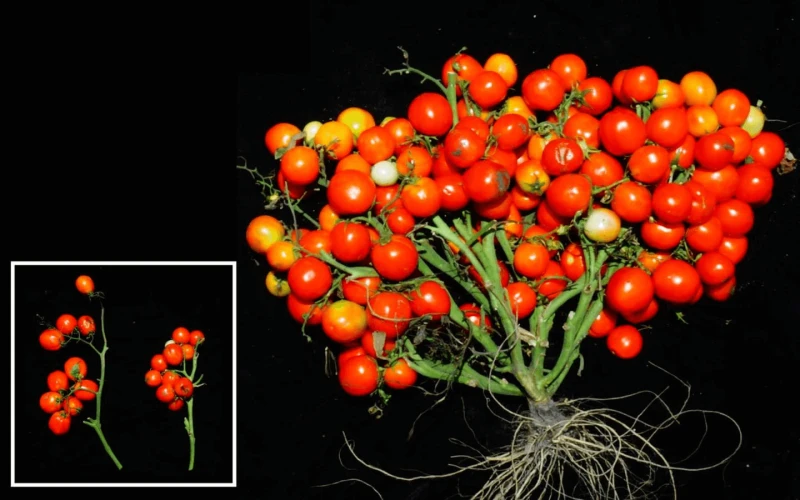Tomatoes ready for harvest in 40 days? Gene edited prototypes could transform one of the world’s most popular fruits
Tomatoes ready for harvest in 40 days? Gene edited prototypes could transform one of the world’s most popular fruits


Scientists have just genetically modified cherry tomatoes to make them easier to grow, and the future applications could include making them more viable for indoor farming and even space travel, their creators say.
The scientists, working out of Cold Spring Harbor Laboratory, used a gene-editing technology called CRISPR to make changes to three key genes within the cherry tomatoes’ DNA. Two of those genes are responsible for when the plant stops growing and starts flowering and fruiting. The third controls the length of the plant’s stem.
The end result is a more compact cherry tomato plant that grows in clusters, like grapes, and also more quickly than unmodified cherry tomatoes, in only around 40 days. These changes make the tomatoes easier to grow in smaller, controlled spaces, like indoor farms, urban rooftop farms, and even spaceships. The scientists published their results in a paper in Nature Biotechnology.
“This demonstrates how we can produce crops in new ways, without having to tear up the land as much or add excessive fertilizer that runs off into rivers and streams,” plant biologist Zach Lippman, one of the scientists behind the project, said in a statement. “Here’s a complementary approach to help feed people, locally and with a reduced carbon footprint.”
This is an excerpt. Read the original post here

 | Videos | More... |

Video: Nuclear energy will destroy us? Global warming is an existential threat? Chemicals are massacring bees? Donate to the Green Industrial Complex!
 | Bees & Pollinators | More... |

GLP podcast: Science journalism is a mess. Here’s how to fix it

Mosquito massacre: Can we safely tackle malaria with a CRISPR gene drive?

Are we facing an ‘Insect Apocalypse’ caused by ‘intensive, industrial’ farming and agricultural chemicals? The media say yes; Science says ‘no’
 | Infographics | More... |

Infographic: Global regulatory and health research agencies on whether glyphosate causes cancer
 | GMO FAQs | More... |

Why is there controversy over GMO foods but not GMO drugs?

How are GMOs labeled around the world?

How does genetic engineering differ from conventional breeding?
 | GLP Profiles | More... |

Alex Jones: Right-wing conspiracy theorist stokes fear of GMOs, pesticides to sell ‘health supplements’




 Viewpoint — Fact checking MAHA mythmakers: How wellness influencers and RFK, Jr. undermine American science and health
Viewpoint — Fact checking MAHA mythmakers: How wellness influencers and RFK, Jr. undermine American science and health Viewpoint: Video — Big Solar is gobbling up productive agricultural land and hurting farmers yet providing little energy or sustainabilty gains
Viewpoint: Video — Big Solar is gobbling up productive agricultural land and hurting farmers yet providing little energy or sustainabilty gains Fighting deforestation with CO2: Biotechnology breakthrough creates sustainable palm oil alternative for cosmetics
Fighting deforestation with CO2: Biotechnology breakthrough creates sustainable palm oil alternative for cosmetics Trust issues: What happens when therapists use ChatGPT?
Trust issues: What happens when therapists use ChatGPT? 30-year-old tomato line shows genetic resistance to devastating virus
30-year-old tomato line shows genetic resistance to devastating virus California, Washington, Oregon forge immunization alliance to safeguard vaccine access against federal undermining
California, Washington, Oregon forge immunization alliance to safeguard vaccine access against federal undermining The free-range chicken dilemma: Better for birds, but with substantial costs
The free-range chicken dilemma: Better for birds, but with substantial costs ‘You have to treat the brain first’: Rethinking chronic pain with Sanjay Gupta
‘You have to treat the brain first’: Rethinking chronic pain with Sanjay Gupta
